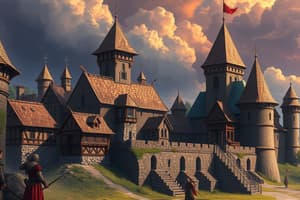Podcast
Questions and Answers
What was a key focus of early humanists during the Renaissance?
What was a key focus of early humanists during the Renaissance?
- Neglecting education
- Rediscovering classical texts (correct)
- Promoting religious orthodoxy
- Advocating for feudalism
How did humanists view the importance of pagan teachings according to the text?
How did humanists view the importance of pagan teachings according to the text?
- They believed that pagan teachings are irrelevant.
- They emphasized learning from past civilizations, including pagan teachings. (correct)
- They supported religious dominance over pagan teachings.
- They argued for casting off all pagan teachings.
What was a significant impact of the Renaissance on traditional religious narratives?
What was a significant impact of the Renaissance on traditional religious narratives?
- Challenging orthodoxy (correct)
- Ignoring religious narratives
- Promoting feudalism
- Strengthening traditional religious beliefs
In the context of the Renaissance, what was one outcome of the conflict among nations like the Thirty Years War?
In the context of the Renaissance, what was one outcome of the conflict among nations like the Thirty Years War?
How did the Renaissance contribute to the evolution from medieval culture to modern humanity?
How did the Renaissance contribute to the evolution from medieval culture to modern humanity?
What was one of the main purposes of feudalism?
What was one of the main purposes of feudalism?
How did feudalism impact trade and commerce?
How did feudalism impact trade and commerce?
What major event altered the economic landscape in Europe in the late 14th century?
What major event altered the economic landscape in Europe in the late 14th century?
Which viewpoint did humanism emerge as a response to?
Which viewpoint did humanism emerge as a response to?
How did feudalism maintain control over the labor force within territories?
How did feudalism maintain control over the labor force within territories?
Flashcards are hidden until you start studying
Study Notes
Feudalism and Humanism: An Overview of the Transition from Medieval to Modern Thought
In order to understand the transition from feudalism to humanism during the Renaissance period, it's essential to delve into each concept separately before exploring their interplay.
Understanding Feudalism
Feudalism was a hierarchical system based on land tenure, where the monarchy granted lands to lords who were obligated to provide military support while maintaining control over the labor force within those territories. This arrangement ensured stability through mutual obligations—the king protected the peasants with his troops, the nobility defended their lands and people, and everyone labored under the protection of their overlords.
The centralization of power in monarchies and the Church meant that all activities were subjected to extensive regulation and taxation. While this may have brought security for some, others felt oppressed by these restrictions, leading to social unrest that further shaped changes in thought during the Middle Ages.
Despite its limitations, feudalism did allow for the development of trade and commerce beyond simple means of subsistence. By the late 14th century, however, the Black Death caused massive depopulation across Europe, altering the economic landscape and paving the way for new ideas to emerge.
Enter Humanism: An Alternate Viewpoint
Humanism emerged as a response to the strictures imposed by the Catholic Church on learning and personal freedom. It emphasized individual worth, the value of knowledge and education, and the importance of civic virtue. Early humanists such as Petrarch believed humans could achieve greatness if given the right conditions.
This movement sought to rediscover classical texts which had been neglected due to Christian dominance and promote them alongside religious instruction. Its proponents argued that one must learn from past civilizations rather than casting off all pagan teachings. They also stressed the importance of independent thinking and critical analysis, values that would later drive scientific progress.
The Intersection of Feudalism and Humanism During the Renaissance
The Renaissance began around the mid-14th century when humanist scholars started reviving ancient Greek and Roman literature, sculpture, architecture, and painting. These works offered alternative perspectives to traditional religious narratives, challenging orthodoxy and laying groundwork for future philosophical advancements.
This shift marked the beginning of modernity; the birth of science and the development of modern philosophy proceeded rapidly thereafter. However, despite these advances, feudalism still held sway until dissolved after decades-long conflicts among nations, including the Thirty Years War. Thus, the Renaissance saw the gradual transformation from medieval culture heavily influenced by religion to more secular pursuits centered around individual achievement and artistic creativity.
As we trace this evolution from feudal society to the dawn of modern humanity, we can appreciate how historical events like plagues or wars might catalyze change within societies. And yet, even amidst turbulent times, humankind proves resilient, adaptive, and capable of rising above adversity to create something truly remarkable - a testament to our enduring spirit.
Studying That Suits You
Use AI to generate personalized quizzes and flashcards to suit your learning preferences.




